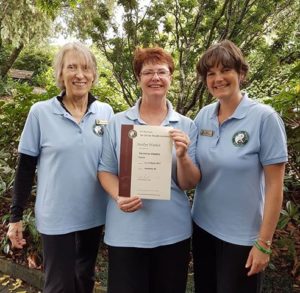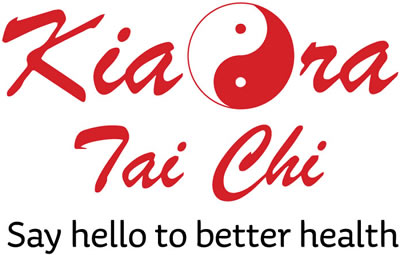by Jocelyn Watkin | Mar 14, 2017 | Information |
 Energy – we all want more! Tai chi is the only exercise I know that seems to give you energy or at least makes you feel more energised.
Energy – we all want more! Tai chi is the only exercise I know that seems to give you energy or at least makes you feel more energised.
Good energy levels are strongly connected with good breathing, which is a key component in tai chi.
Of course, without breath there is no life. You’ve probably heard that old tai chi joke: Student asks: “Master, what is the secret of a long life?” Master replies: “Keep breathing for as long as you can.”
I’ve recently upgraded my instructor qualifications to include Tai Chi for Energy. This programme was created by Dr Paul Lam of the Tai Chi for Health Institute by combining the movements of two different tai chi styles, Chen and Sun:
- Chen style is vigorous and complex, combining fast and slow movements with powerful spiralling, seemingly elastic force.
- Sun style incorporates unique qigong (life energy) movements with agile stepping.
Together, these two contrasting styles enhance energy flows, which can relax, refresh and revitalise. As such, Tai Chi for Energy can help to improve your health and wellness, internal energy, and the ability to manage stress. This form is a natural sequel of Tai Chi for Rehabilitation (which I’m also qualified to teach).
I look forward to teaching my students this exciting and energising tai chi form.
Find out more:

Jocelyn Watkin (centre) was awarded the Tai Chi for Energy Instructor qualification by Master Trainers Janet Cromb (left) and Tamara Bennett (right)
by Jocelyn Watkin | Jan 29, 2017 | Information |
 Please note: This is a post from February 2017.
Please note: This is a post from February 2017.
Free tai chi lessons: Monday 13 and Wednesday 15 February 2017, 6.30pm, in Manurewa.
Do you want to get fitter and healthier? Do you feel stressed or have trouble sleeping? If boot camps are not for you or you want to wave good-bye to the gym then say hello to Kia Ora Tai Chi.
Come along for FREE 45-minute tai chi lessons on Monday 13th and Wednesday 15th February at 6.30pm, with Jocelyn Watkin, a qualified tai chi instructor, who has been practising tai chi for 14 years. Adults and high school students are all welcome.
What to wear: Please wear loose comfortable clothing and flat-soled shoes (such as sneakers, trainers or tennis shoes). Please also bring a drinking bottle of water.
What to expect: The class will begin with a sequence of easy, flowing exercises which are low impact and gentle on your joints. Jocelyn and some of her students will then demonstrate the tai chi form so you can see what it looks like. After that, you can have a go for yourself and learn the first few steps. In just one class, you’ll be doing tai chi. Join a friendly bunch of people at a great venue, which has lots of free parking.
Longer term, tai chi can help you to improve your fitness, health and balance, reduce stress and lower blood pressure. It is an ancient, Chinese martial art that involves a series of movements performed in a slow, focussed manner and accompanied by deep breathing. Tai chi is suitable for all ages and fitness levels. If you are unable to stand for very long, Jocelyn is also qualified to teach seated tai chi, which you can do alongside the rest of the class.
Dates/times/pricing: Mondays and Wednesdays in Manurewa. After the free lessons, a beginners’ class will start on Monday 20th and Wednesday 22nd February 2017 from 6.30 – 7.15pm. Lessons from $9.50 per class. To RSVP, contact Jocelyn: 027 493 9851 or use the Contact Form to get in touch.
For more information:
by Jocelyn Watkin | Sep 10, 2016 | Information |

Great Wall of China
What made me leave my tai chi school of nearly 14 years to become an instructor for the Tai Chi for Health Institute?
I had been stuck on a plateau for some time, due to the ‘one size fits all’ or ‘cookie cutter’ approach of my then tai chi school. I searched for more stimulation and development; I read books, trawled through the Internet and tried a couple of different tai chi schools. I even organised a tai chi tour to China in 2015 and climbed sacred Wudangshan (Wudang Mountain), the tūrangawaewae of tai chi (spiritual home and place to stand for all who feel connected to tai chi).
Other tai chi schools were iniitally helpful in my quest but they didn’t have what I was looking for long-term, or their type of tai chi aggravated an old injury I had.
On YouTube I discovered Dr Paul Lam, the founder and director of Tai Chi for Health Institute (TCHI). I was instantly struck by his openness, his formidable tai chi, his philosophy that tai chi is for everyone and the thorough medical research that he’d conducted to prove the health benefits of tai chi.
A quick search of the TCHI website revealed that one of his two master trainers for New Zealand, Tamara Bennett of Smiling Dragon Tai Chi & Qigong, offered classes at Pukekohe, only 25 minutes away from my home. I soon rocked up to her classes and was impressed.
As I am a qualified teacher for the New Zealand education system, I instantly spotted that Tamara understood teaching methodology and was following a lesson plan. This was the first time I had encountered this in my 20 years of learning martial arts. If someone is good at one skill (whether karate, tai chi, music, maths, cooking, etc) it doesn’t automatically follow that they’ll be good at teaching it. Teaching is an acquired skill that must be learned, just like any other skill. I found out later that Tamara was following the Stepwise Progressive Teaching Method, which had been devised and perfected by Dr Lam.
I was also blown away by her tai chi ability. Throughout my 14 years of tai chi, I had been told by my (now ex) instructors that people who teach it for the health benefits don’t do ‘proper’ tai chi. Well, this was ‘real’ tai chi alright. All of the essential tai chi principles were there in Tamara’s movements and form.
What’s more, she and her students were friendly and welcoming. The barriers I had previously encountered (my age, ethnicity and being female) were not held against me.
Very soon I was flourishing with TCHI’s mix of the Chen, Sun and Yang forms, especially the welcome addition of Qi Gong in the Sun style of tai chi. I loved the blend of Chinese and Western philosophy and medical knowledge. I knew that this was the tai chi school that I would like to be part of.

Tamara awarding my instructor certificates
I had not wanted to become a tai chi instructor until then. As a professional teacher, tai chi gave me a break from teaching. However, a career change meant that I was more open to become a tai chi instructor. When I discovered that TCHI had well-thought out and proven programme to teach instructors, I knew that I would take that path.
I am now a premier TCHI-Board Certified Instructor for four Tai Chi for Health Programmes (find out which ones here). I am also a member of the Tai Chi for Health Community in New Zealand.
I met Dr Paul Lam at recent instructor workshop. He is as genuine and open as he is on YouTube. His tai chi was even more formidable face-to-face than it is on YouTube.
Tamara and my fellow instructors encouraged me to start teaching my own classes. Two came along to my very first opening night to support me and, along with Tamara, they continue to be trusted colleagues that I can call on for advice. Thank you so much Tamara Bennett, Aria Tauroa and Ian Blaine.
A big ‘shout out’ to the Sunday Club guys, too. You know who you are. I could not have come this far without you so thanks for ‘being there’ for me.
I love teaching and I am able to incorporate all of my tai chi skills and knowledge, including from my wider martial arts and teaching background. My students come from all walks of life, are friendly and helpful with each other, and they all want to do well with their tai chi. I can see that they practice between classes and that’s pretty amazing when compared with my experience at other tai chi schools.
After being stuck on a plateau for so long I feel energised and excited about my tai chi and the future. TCHI has been the right move because it offers:
- A thorough teaching syllabus and proven teaching methodology, the Stepwise Progressive Teaching Method, which is backed up by teaching DVDs.
- Medical research and case studies to prove the health benefits of tai chi.
- Well-established Tai Chi for Health Programmes that maximise these health benefits.
- A TCHI Board-Certification process to become a Tai Chi for Health Instructor.
- Support from the NZ master trainers and fellow instructors (of TCHI) and through my membership of Tai Chi for Health Community in New Zealand.
- Adherence to the essential tai chi principles, i.e. this is ‘real’ tai chi
- A mix of the Chen, Sun and Yang tai chi styles, plus Qi Gong and meditation
- Tai chi for everyone including making it accessible to as many as possible, particularly those less able or who have health issues.
- Acceptance that people learn and move in different ways, according to their own style, body-shape, age, etc
- An open, welcoming and safe environment where know-how is shared and questions encouraged.
- Greater diversity and range of tai chi skills and knowledge, due to the acceptance that one person or ‘guru’ cannot know everything.
- Opportunities to advance my own tai chi, including weapons training, whether I wanted to be an instructor or not. I.e. advanced students are not held back because they are not instructors.
- Friendly people that know when to be serious about tai chi and also how to have fun with it.
- The positivity and determination of Dr Paul Lam (the founder and director of TCHI) to ensure the above points and over-arching kaupapa (guiding principles and thinking) are embedded into everything that TCHI stands for.
Find out more:
Photos from Wudangshan (Mt Wudang), Hubei province, China:

Jindian Temple at the summit of Wudang Mountain, 900 steps up

Mt Wudang summit (and the Jindian Temple) – view from the top

 Energy – we all want more! Tai chi is the only exercise I know that seems to give you energy or at least makes you feel more energised.
Energy – we all want more! Tai chi is the only exercise I know that seems to give you energy or at least makes you feel more energised.

 Please note: This is a post from February 2017.
Please note: This is a post from February 2017.



